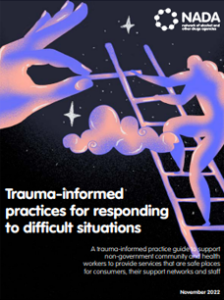 ‘Trauma-informed care is being treated with kindness— human kindness is what’s most important.’ (Tony, consumer)
‘Trauma-informed care is being treated with kindness— human kindness is what’s most important.’ (Tony, consumer)
Trauma-informed care is essential when delivering services and can be implemented in any service setting. Every person has a responsibility to practice in ways that are trauma-informed.
This practice guide contains information and advice for providing safe and inclusive service environments for people accessing support, their networks, and staff. It provides practical tips for preventing and responding to difficult situations using a trauma-informed, person-centred, and strengths-based approach.
This resource includes feedback from people with lived experience of accessing non-government services and what they consider to be important tips for best practice trauma-informed care.
It will support the work that you and your organisation engage in every day.
What’s inside?
Designed as a practice guide, it comprises sections on:
- understanding trauma and its effects
- core principles of trauma-informed care
- the importance of language
- responding to difficult situations
- worker wellbeing
- links to other resources, information and support services
- and much more.
Related resources and videos











